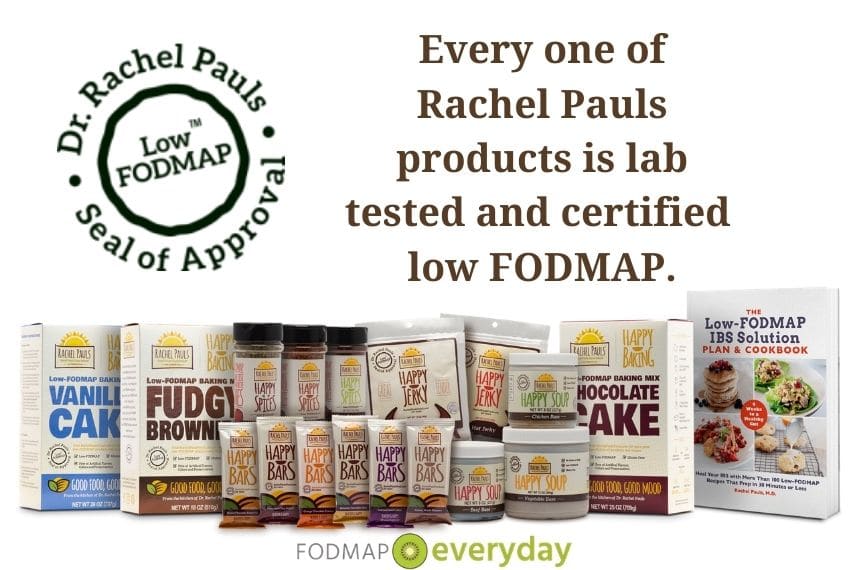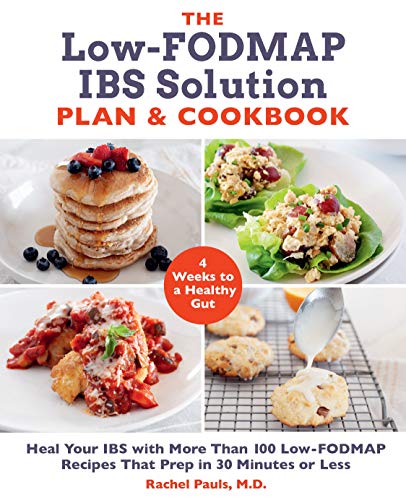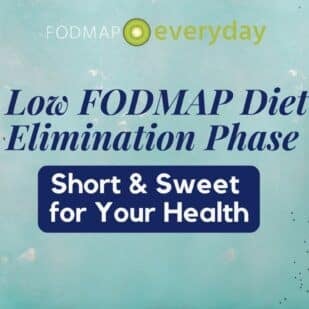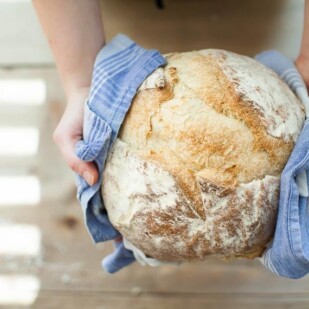Coming across commercially prepared products that are specifically designed for the low FODMAP diet is always exciting. And when they are lab tested and certified low FODMAP we consumers have the assurance that they are compliant with the diet.
We assume you know that Monash University and FODMAP Friendly both lab test and certify products, but did you know that the Rachel Pauls Food brand does as well? And yes, there is a Rachel Pauls behind the brand, who is a MD and follows the diet herself.

Rachel Pauls Low FODMAP Products
If you are not familiar with Rachelpaulsfood.com, be sure to make a visit. There are hundreds of recipes as well as a shop featuring their own products, from Happy Bars energy bars, Happy Soup bases, Happy Jerky, Happy Spices (several blends) as well as baking mixes like Chocolate Cake, Vanilla Cake and Fudgy Brownies. And every one of Rachel Pauls products is lab tested and certified low FODMAP.
Dr. Pauls has also written a best-selling book, The Low-FODMAP IBS Solution Plan & Cookbook, which offers a 4-week guide to following the diet and more than 100 recipes that can be made in 30 minutes or less.
Meet The Remarkable Dr. Pauls
We thought it was high time to sit down with Dr. Pauls to learn more about her personally, and to talk about what she has brought to the FODMAP community.
Dédé Wilson: Dr. Pauls, I am so glad we are finally doing this. I have been aware of your brand for several years and had noticed the certification language on your site but was never sure what it meant. I think when we get to that part of this interview the information is going to be a huge happy surprise for many FODMAPers. But first, let’s talk about you.
You are a MD with a specialization in Urogynecology, and the Program Director for a leading Female Pelvic Medicine and Reconstructive Surgery fellowship. You have published over 100 journal articles (including research related to IBS and FODMAPs), were named Mentor of the Year in 2012 by the American College of Obstetricians and Gynecologists in recognition of your role in teaching and training aspiring physicians and surgeons, are a mother of 3, have a brown belt in Taekwondo, and have treated your own IBS with the low FODMAP diet.
When we interviewed you initially, you squeezed us in when you weren’t in surgery. And in your “spare” time you have created your Rachel Pauls website resource, with products and recipes. I guess the first question should be, how many hours of sleep do you get per night? In all seriousness, tell us about how you first learned about the low FODMAP diet and how you made the decision to apply it to yourself.
Thanks for that introduction Dédé! I am also thrilled to be having this conversation with you.
My own struggles with IBS began about 12 years ago. Like many people who suffer from the condition, symptoms of gas, bloating, diarrhea and their avoidance played a prominent role in my life. I was constantly searching for answers and tried almost every therapy I could find. While I knew that foods were triggering my symptoms, I could not figure out which foods those were! Then, in 2012, I read some research related to the low FODMAP diet. It was like a lightbulb went off in my head! I committed myself to beginning the Elimination phase and was absolutely elated when all my symptoms began to disappear. I’m so much happier now!
The Journey From IBS to Low FODMAP Products Maker
It is so interesting…women like you and me and Kate Scarlata, to name a few, have all had personal experience with IBS and have gone on to make it a point to help others with the diet. Tell us when and why you decided to launch your website.
People like you and Kate have been such an inspiration for me. Our mutual passion to share this message speaks volumes about the positive impact of the low FODMAP diet.
When I began my low-FODMAP journey, I struggled to find delicious, convenient food options suitable for my hectic lifestyle. I began experimenting with recipes to create energy bars for myself to enjoy. Around 2014, I decided that I should share my creations so that people like me could more easily manage their IBS. From that, Rachel Pauls Food was born and launched in 2016 with our first product, ‘Happy Bars’.

Use the code “HAPPY” when checking out and get 10% off of your entire purchase! Good until June 18th, 2021
Our mission is to help people live healthier and happier lives through great tasting, low FODMAP food. To that end, we now have about 20 products with several more in development. Our website also has numerous free resources including more than 400 low FODMAP recipes and a downloadable free FODMAP Guide. For me it’s a labor of love.
Not Just Products! Recipes & Resources Too!
Since you follow the diet, are some of the recipes on your site ones that you love to make for yourself and your family? We know a lot of people worry that they will have to make different dishes for different members of the family. Talk a little about how you navigate this, like, do you broaden choices for the non-FODMAPers in the family in order to keep everyone’s microbiome happy and healthy? And also, especially since you are a medical doctor, please take a moment to explain why it is so important for people not to stay on the Elimination Phase for a prolonged period of time in relation to our microbiome.
Absolutely! I love that you asked me about this. This is something that I am very passionate about.
For starters, the recipes on my site are the same delicious, fun, varied and healthy meals my entire family enjoys (including three fussy teens)! Everything I share on the blog has received their ‘thumbs up’. We also constantly receive emails from readers who tell us that their ‘non-FODMAP’ family members love our recipes and products too. I never want people to feel deprived by following a low FODMAP diet.
Modified Low FODMAP Diet: Maintaining A Healthy Microbiome
Yes! We are very anti-deprivation around here, too!
The second question is very important and requires a longer answer. As a doctor and scientist, I understand that much of medicine is not fully understood, and there is not a ‘one size fits all’ approach for everyone. The fact is research on the microbiome is still in its infancy. Doctors don’t actually know what the ideal microbiome is, but we do acknowledge it fluctuates based on many factors, including the foods we eat.
While I recognize that maintaining any restrictive eating plan long-term may have implications for the microbiome, I also know that some people (including me) may decide that a ‘modified low FODMAP diet’ is their preferred lifestyle choice. A ‘modified’ low FODMAP diet is, as you know, personalized based on individual tolerances.
I believe this may be reasonable, provided the following:
1. We eat a variety of foods
Let me explain what this means. When we discuss a ‘healthy’ microbiome, we are looking for diversity in that microbiome. We believe having a ‘diverse’ microbiome is optimal. We also believe that eating a variety of foods contributes to that diversity.
In my opinion, the perception that the low FODMAP diet is not varied is based on antiquated teachings and food lists (about 10-15 years old). Today, we have so much more information about the many foods that are considered reasonable to consume, provided a low FODMAP portion size is eaten.
Additionally, many of the studies evaluating low FODMAP diet followers’ food variety based their data on just a 4-week period of time. Do you remember the first four weeks you followed the low FODMAP diet? I do! I probably ate the same 5 or 6 foods each day…since I was so afraid of triggering my symptoms. Obviously, that is different from how I eat today!
2. We incorporate ‘pre-biotic’ foods
The presence of ‘probiotic’ bacteria in the intestine contributes to a healthy microbiome. You have probably heard about taking probiotic supplements to help your digestion. Well, probiotic bacteria that live in our intestines consume prebiotic fiber. Prebiotic fiber comes from foods that are not digested well (like onion, garlic and asparagus, i.e., those which are typically high FODMAP).
This is a key reason that there is a push to begin adding back high-FODMAP foods…to increase that prebiotic fiber, so the probiotic bacteria thrive.
However, there are low FODMAP foods that are prebiotic. Consuming those (such as oats, jicama, and flaxseeds to name a few) can help sustain the microbiome, while still following a low FODMAP diet.
For more information, and a longer list of these foods, see my blog post, which describes a modified low FODMAP diet.
I believe that if people are happier while following a modified low FODMAP diet, we shouldn’t chastise them for this choice, but rather, educate them on the best way to do so. The recipes on your website and mine are a perfect way to add a variety to their menu without compromising their tummy.
Oh, how I love this answer! One of my pet-peeves is when folks use the term “low FODMAP diet” (even the GIs) when what they are describing is just the Elimination Phase. As you point out (and we do, too, all the time) this diet has different phases. Like you, I too am on an extended modified low FODMAP diet, and that means I have incorporated and integrated foods back into my diet that do contain FODMAPs, but at a level that do not trigger my symptoms.
The public gets confused when they hear or read that you shouldn’t be on the low FODMAP diet for too long. The Elimination Phase is short, but a modified low FODMAP diet is actually a long-term goal.
Rachel Paul Lab Tested Low FODMAP
Now, let’s dive into what I am most excited about – please tell us all about the low FODMAP lab testing that you do for each and every one of your products.
This is such a key concept to our company’s mission. Every product we develop must have two attributes. First, it must taste great. Second, it must be low FODMAP in accordance with published medical research and expert opinion. Low FODMAP thresholds are documented in medical science, and laboratory testing for these components is also standardized.
Therefore, to determine if something is low FODMAP we do not rely on its ingredient list. It simply is not an accurate enough method for us.

This is an important statement. I increasingly look at low FODMAP foods (ones that have been lab tested) as distinct from ones that might be tolerated. Two different things!
We send our products to a reputable, accredited food laboratory in the United States connected with a large research university. We ask the laboratory to report back to us regarding the FODMAP levels per serving of product. If a product is found to be low FODMAP in accordance with published research and expert opinion, it receives the Dr. Rachel Pauls Low FODMAP Seal of Approval and we will sell it, providing it also tastes great. Each product bears my name, my seal, and my promise as a doctor that it is laboratory certified as low-FODMAP.
Thank you so much for that explanation. I think a lot of people will be looking at your products in a brand-new light. Personally, I think having lab testing to back-up low FODMAP claims is important. Do you have a favorite product of yours? And is there one that your community loves in particular?
I eat a Peanut Maple Pleasure Happy Bar every morning and have for the past five years! It makes my tummy happy and fills me with energy. I also love all of our soup mixes, spice blends and vanilla cupcakes. As for the community, we feel overjoyed by the positive feedback and success of all our products. In fact, our biggest problem right now is keeping enough inventory.
Have you counseled patients in regard to the diet, even though that isn’t your focus?
Yes. Although I specialize in urinary incontinence and pelvic floor disorders, many of my patients also have IBS and I love being able to provide guidance to them. I also work closely with several Gastroenterologists and we frequently discuss IBS and the latest developments in the field.
From a medical perspective, how do you see the future of the diet? You are in the U.S., as are we, and we know it is still not as widely known or understood as it might be. Do you have thoughts about how this could be furthered along?
Medical research has consistently proven that the low-FODMAP diet is the most effective treatment for IBS. We both know from experience how life-changing it can be!
While we do need to raise awareness at the medical provider level as well as among the public, I believe strongly that things are starting to catch on. People like you and me sharing our stories with our websites and social media presence will lead to more interest, and ultimately help the millions of people in this country that suffer from IBS and other digestive issues.







